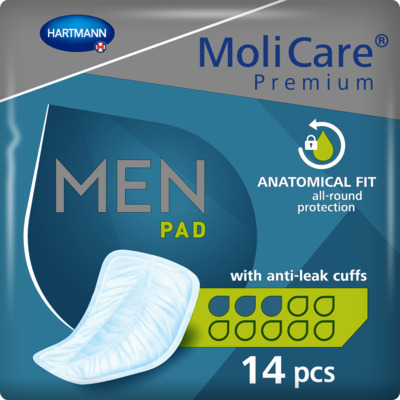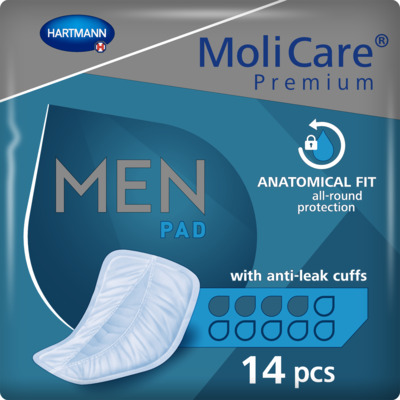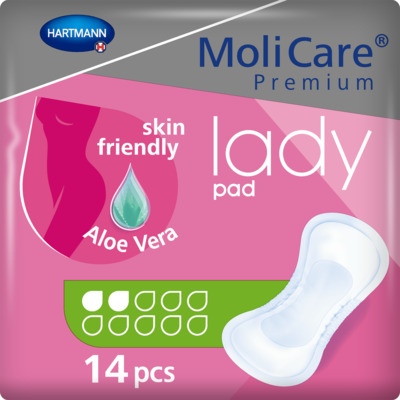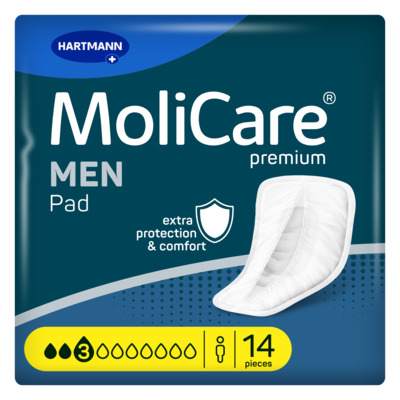Incontinence Advice
Is Bladder Incontinence Considered a Disability in the UK?
Understanding whether bladder incontinence is considered a disability in the UK is crucial for those affected by this condition and can determine which benefits are available. In this article, we will explore the definition of disability from a medical, legal and social model, and discuss how the Equality Act 2010 can impact rights and protections. Furthermore, we will find out how individuals with bladder conditions that cause incontinence are eligible to receive disability benefits and how this can improve quality of life under current UK law.

What is a disability?
When exploring whether bladder issues qualify as a disability, it's important to look at the different frameworks used to define disability from a medical, legal and social perspective.
- The medical model: In this framework, disabilities are defined through clinical diagnoses. For instance, overactive bladder (OAB) as a symptom may not be independently recognised as a disability, but its underlying causes, such as neurological damage, could be classified as such.
- The legal model: This model considers disability based on eligibility for support and legal protections against discrimination. The question of bladder incontinence being a disability in the UK often hinges on this model. The Equality Act 2010 plays a crucial role here, too, stating that a condition like incontinence can be considered a disability if it significantly impairs daily functioning over a long period of time.
- The social model: From this perspective, disabilities result from societal barriers rather than the physical or mental impairments themselves. For those with incontinence, a lack of accommodations, such as access to a toilet at work, can exacerbate their challenges and hinder their full participation in society.
Is Bladder Incontinence A Disability
Is Incontinence A Disability?
Under the Equality Act 2010, incontinence is indeed classed as a disability if it has a "substantial and long-term adverse effect" on a person's ability to perform normal day-to-day activities.” This legal recognition is crucial for those seeking to understand if they are eligible and accessible for incontinence benefits or disability allowances, like Personal Independence Payment (PIP) for bladder problems.
Moreover, whether the condition causing bladder incontinence is considered chronic (long-term) affects its status as a disability. Chronic conditions, particularly when linked to unmanageable symptoms that severely impact life quality, may qualify for disability benefits under UK law. This acknowledgement allows individuals to receive the necessary support and accommodation required to engage in society so they can manage their condition more effectively.
Understanding the equality act 2010
The Equality Act 2010 refers to disability rights in the UK, providing extensive protections and defining what constitutes a disability—including conditions that cause bladder incontinence.
Protections under the act:
The Equality Act 2010 ensures that individuals with disabilities receive equal treatment in various sectors, including employment and education, and have equal access to goods, services, and facilities. For people with bladder conditions, these protections are crucial. They ensure that conditions requiring frequent toilet breaks are accommodated in workplaces and public spaces, thus enabling individuals to participate fully in society without fear of discrimination.
Definition of disability:
According to the Act, a disability is “a physical or mental impairment that has a substantial and long-term negative impact on a person's ability to perform normal day-to-day activities.”
"Substantial" is defined as more than minor or trivial, and "long-term" means lasting or expected to last at least twelve months.
Progressive conditions:
The Act also covers progressive conditions from the point of diagnosis. Conditions like HIV, cancer, and multiple sclerosis are recognised as disabilities immediately upon diagnosis. This provision is crucial for ensuring early intervention and support.
Exclusions:
The Equality Act 2010 does not specifically list conditions that are excluded from protection. Instead, it focuses on defining what constitutes a disability. However, there are certain conditions or circumstances where the Act’s protections may not apply, such as temporary conditions, past disabilities or minor impairments which do not significantly impact an individual’s ability to carry out their day-to-day activities.
Accessing further guidance
To find further information about disability benefits, including incontinence benefits, the government website provides detailed statutory guidance. This guidance aids courts and tribunals in determining who qualifies as disabled under the Act. The Equality Advisory Support Service (EASS), is a government-funded helpline that has replaced the Equality and Human Rights Commission Helpline. This website, offering additional support and information to individuals seeking clarification on their rights and the provisions of the Act.Managing bladder incontinence in employment
Deciding whether to inform your employer about bladder incontinence can be daunting. Under the Act, it is unlawful for employers to discriminate against individuals with a disability. This protection covers all stages of employment, from recruitment to workplace accommodations.
Reasons to disclose may include:
Legal protection: The Act requires employers to make reasonable adjustments for employees with disabilities to support their work capability. This might include allowing flexible break times or providing access to toilet facilities closer to the workspace.
Workplace support: Being open about your condition can lead to better understanding and support from your employer and colleagues.
When to disclose:
During recruitment: You might choose to disclose your condition on application forms to ensure any necessary accommodations can be arranged from the start.
Existing employment: If your condition is affecting your work, discussing it with your employer can lead to adjustments that improve your work life and productivity.
While the law protects against discrimination, workplace dynamics can vary. It's important to prepare for potential challenges. Some coworkers might lack understanding which could lead to uncomfortable situations. Alternatively, being transparent with your employer and colleagues can foster a supportive environment, although this is not guaranteed.
Practical tips for managing bladder incontinence at work
There are a few routine adjustments that can be maintained by yourself in the workplace so that sufficient time can be allocated to properly manage OAB. This may include:
Establish a regular bathroom break schedule.
Know the locations of all accessible bathrooms in your workplace.
Use protective products if necessary to prevent accidents. For example, we offer plenty of discreet continence products to ensure you remain comfortable in the workplace when handling bladder conditions.
Obtaining a Just Can't Wait card for urgent access to facilities, reducing stress and potential embarrassment.
Keeping a change of clothes at work for peace of mind.
Seeking help
Understanding whether OAB is a chronic condition is crucial. Start with a medical evaluation to discuss symptoms and potential treatments. This diagnosis will be essential for any disability claims, and can also be done for those who act as carers for people that are incontinent.
Legal and disability support
As discussed, there are plenty of methods to obtain legal and disability support when handling bladder incontinence such as:
Personal Independence Payment (PIP): If incontinence significantly impacts your life, you might be eligible for PIP.
Employment support: You can contact the Employment and Support Allowance (ESA) or Age UK for guidance on disability benefits.
Legal advice: If you face workplace discrimination, consult a lawyer who specialises in disability rights.
In conclusion, bladder incontinence and overactive bladder (OAB) can be considered disabilities under the UK's Equality Act 2010, entitling individuals to legal protections and reasonable accommodations in employment and daily life. Understanding your rights and the available support is crucial towards overall wellbeing. Whether seeking disability benefits or understanding employment challenges, legal and medical advice is crucial so that you can receive the maximum potential suitable for your condition.

FAQs
Can I claim disability benefits for incontinence?
Yes, you can claim disability benefits for incontinence if it significantly impairs your daily activities and ability to work, and meets the specific criteria set by the Equality Act 2010.
Which bladder conditions qualify for disability?
These include chronic incontinence, interstitial cystitis, bladder cancer, and other conditions that severely affect bladder control and require ongoing medical treatment.
What are the best aids or pads to take to work to manage incontinence?
Consider products that have a slimline-fit, are individually wrapped, concealable, and can be easily disposed of within the workplace.
GOV.UK. (2010) Equality Act 2010. UK Public General Acts. [online] Available at: https://www.legislation.gov.uk/ukpga/2010/15/contents [accessed 09/05/24]
GOV.UK. (2013) Personal Independence Payment. [online] Available at: https://www.gov.uk/pip [accessed 09/05/24]
EASS. (2013) Equality Advisory and Support Service. [online] Available at: https://www.equalityadvisoryservice.com/ [accessed 09/05/24]
Just Can’t Wait. (2017) FREE Just Can’t Wait Card. Bladder and Bowel Community. [online] Available at: https://www.bladderandbowel.org/help-information/just-cant-wait-card/ [accessed 09/05/24]
Age UK. (2023) Related Issues: Claiming Benefits. [online] Available at: https://help.ageukincontinence.co.uk/hc/en-gb/articles/10409753767570-Related-Issues-Claiming-Benefits [accessed 09/05/24]

MoliCare® Premium Men Pad 3 Drops
<h2>Suitable for men with bladder weakness</h2> <p>Suitable for men of all age groups, body shapes and sizes, it truly is a one size fits all with this range. It is never pleasant to go about daily activities with the potential risk of an incontinence slip, MoliCare® have created the Premium Men Pad 3 drops, designed with a V-Shape to comfortably fit around the desired area, and has a textile-like back sheet for extra protection.</p> <p>To make sure that you choose a premium men pad that is right for you, check out the additional features of this product range:</p> <h2>Leakage protection for men you can rely on</h2> <p>With a body-shaped design, these absorbent mens pads offer reliable protection for men with light bladder weakness. The soft, cotton-like materials ensure discreet comfort, and the odour neutraliser keeps you feeling fresh and confident.</p> <h2>Secure fit and skin-friendly</h2> <p>The Premium MEN Pads feature a wide adhesive strip for secure fixation in your regular underwear, providing you with peace of mind during your daily activities. The soft and breathable materials are gentle on your skin, maintaining its health with a skin-friendly pH.</p> <h2>All-round protection for men</h2> <p>MoliCare® Premium MEN Pads are equipped with a quick dry system, anti-leakage system, and cuffs for added security, ensuring all-round protection you can trust. Dermatologically tested, these pads are safe and reliable for daily use.</p> <h2>Tailored for your needs</h2> <p>Available in different absorbency levels, MoliCare® incontinence products for men cater to varying degrees of incontinence, providing you with the level of care that suits your needs. MoliCare® Premium MEN Pads are perfect for daily wear or when you need extra protection against slight to moderate incontinence. Discreet and comfortable, they enable you to maintain your active lifestyle with confidence.</p> <h2>Fast and reliable delivery</h2> <p>Our quick ordering service makes it easy to get the incontinence products you need. Additionally, our price match promise ensures you get both quality and value for money.</p> <p>Enjoy fast delivery on all orders over £50 when you purchase from HARTMANN Direct.</p>
MoliCare® Premium Men Pad 4 Drops
<h2>Comfortable and absorbent</h2> <p>Why MoliCare for men? Hers are some of the key features of the MoliCare® Premium Men Pads from Hartmann:</p> <ul> <li>Discreet and comfortable</li> <li>Fits the male physique</li> <li>3-layer absorbent core</li> <li>Fast-absorbing system</li> <li>Anti-leakage cuffs</li> <li>Odour neutralisers</li> <li>Wide adhesive strip</li> <li>Skin-friendly</li> </ul> <p>With an affordable price and great quality guarantee, you cannot regret choosing MoliCare® Premium Men Pad 4 drops, equipped with anti-leak cuffs, and 14 pieces per bag.</p> <h2>Slim and discreet under clothing</h2> <p>MoliCare® Premium MEN Pads offer reliable support for men dealing with bladder weakness. Whether it's stress incontinence or urge incontinence, these pads for men are designed to provide a discreet and quick solution on the go. Simply place the pad before applying your underwear and secure it with the adhesive strip for worry-free protection. MoliCare® Premium MEN Pads offer full coverage for men facing very light to moderate bladder weakness.</p> <h2>Leakage protection for men</h2> <p>MoliCare® understands that each individual's incontinence needs are unique. That's why our incontinence products, including MoliCare® Premium MEN Pads, are available in different absorbency levels. You can find the perfect fit and protection for your specific requirements.</p> <h2>Reliable and soft on the skin</h2> <p>Our body-shaped absorbent pads are designed to deliver dependable and skin-friendly incontinence protection every day. Experience discreet comfort with the soft, cotton-like materials and the added benefit of an odour neutraliser, ensuring you feel fresh and confident throughout the day.</p> <h2>Fast delivery to your home</h2> <p>At HARTMANN Direct, we ensure a fast delivery service for all our products. Enjoy free delivery on orders over £50, making it convenient and hassle-free to receive the incontinence products you need. Our dedicated customer care team is here to discuss your incontinence product needs and answer any questions you may have. Call us today on 0800 028 9470 to experience the comfort and confidence that MoliCare® Premium MEN Pads can provide.</p>
MoliCare® Premium Lady Pad 2 Drops
<h2>Skin Friendly Pant Liners</h2> <p>For women that experience slight incontinence and bladder weakness, across different age groups, it can be a challenge to find the right bladder weakness product that is easy to apply and wear without the worry of potential leakages. Fortunately, we understand this approach, hence why we are happy to offer our MoliCare® Premium Lady Pad 2 drops, that is skin-friendly, Aloe Vera applied, and comes with 14 liners per bag.</p> <h2>Slim and discreet liners</h2> <p>Whether dealing with stress incontinence or urge incontinence, these panty liners offer a discreet and easy solution on the go. Simply place the pad in your underwear and secure it with the adhesive strip for all-round protection. Available in different absorbency levels, MoliCare® bladder weakness products cater to all levels of bladder weakness, ensuring secure care.</p> <h2>Control Bladder Weakness</h2> <p>Enjoy the benefits of these body-shaped absorbent panty liners, designed for women with bladder weakness. The pads offer discreet, reliable protection with features including odour control and fast absorption.</p> <p>With a wide adhesive strip, you can comfortably fix the pad in your regular underwear, providing secure and comfortable fixation. The pads are skin-friendly, featuring soft, breathable materials, including foam cuffs, and a top sheet treated with Aloe Vera.</p> <p>Keeping your skin healthy is a priority, which is why MoliCare® Premium Lady Pads have a skin-neutral pH value of 5.5 and an antibacterial finish. They are also dermatologically tested, offering peace of mind.</p> <h2>Buy pant liners online</h2> <p>Never worry about running out with our convenient order service and fast delivery direct to your door. Enjoy free shipping on orders over £50.</p> <p>If you need assistance, our professional customer service team is here to support you in choosing the right product. Reach out to us today at 0800 028 9470 and experience the comfort and reliability of MoliCare® Premium Lady Pads.</p>
